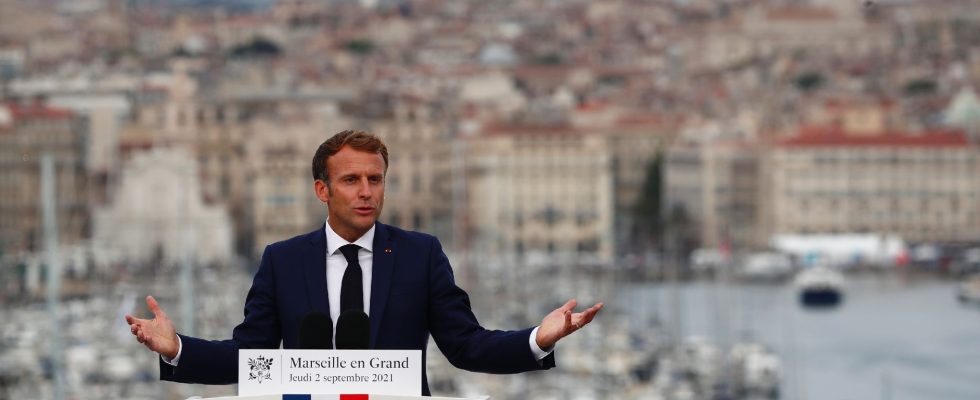Emmanuel Macron is back in the Marseille city, from Monday June 26 to Wednesday June 28, for a visit with great fanfare. According to the Elysée, the President of the Republic is moving to Marseille with the ambition to “change the daily life” of the inhabitants and to make the city the “capital of the Mediterranean”. It will look at “security issues”, “neighborhood life”, school, access to care, “degraded condominiums” and “the future of the port”, indicated the Elysée without further ado. details.
This trip is the longest made by the Head of State since 2021, when he went to… Marseille. He had kicked off a vast plan called “Marseille en grand” aimed at improving the lives of the inhabitants of the second city of France. He then put five billion euros on the table to strengthen the police, renovate schools, accelerate urban renewal. In short, to help Marseille catch up on its many delays…
The Élysée welcomes the first results of this plan, with the reinforcement of more than 300 police officers, 120 mediator educators, the launch of around twenty major projects on the 470 schools in Marseilles as well as the start of work for a new line of tram. But in the poor neighborhoods of the city, time still seems suspended, and much remains to be done in the capital of Bouches-du-Rhône.
End unfit housing
One of the priorities for the President of the Republic: unfit housing. Marseille has some 40,000 slums and as many requests for social housing. The subject came back on the table recently, with the destruction of a building located in the center of Marseille, which had caused a victim and dislodged a hundred people. In 2018, the collapse of a building located in rue d’Aubagne, in the Noailles district, during which eight people lost their lives, caused a wave of emotion and anger among the people of Marseille, shedding light on the housing problems in the city.
Another downside: the city lives under the threat of a deficiency procedure in the construction of social housing, failing to achieve its objectives between 2020 and 2022. Faced with this situation, the president had announced a doubling by l State of the envelope dedicated to urban renewal, increasing from 300 million to 650 million euros in 2021.
Ensuring the safety of Marseille residents
During his last visit, in September 2021, the President of the Republic was apostrophized by residents of the Brassens city, located in the north of the city. They had told him of the “fear” of coming home at night when it shoots “like in a western”. Since then, 300 additional police officers have arrived in Marseille, as well as 21 new judicial police officers. Of the 60 magistrates and judicial staff promised, barely half are in office.
The mayor of Marseille, Benoît Payan asks the president “for greater reinforcements in PJ, in scientific police and in financial police”, considering that “we do not treat drug trafficking with bruises on the public highway”. Marseille “needs magistrates, clerks, investigating judges, prosecutors” because “we have to go into arms and into money”. Emmanuel Macron should also meet behind closed doors with families of victims of score settling, according to local sources.
Fix the school problem
The renovation plan for the 470 Marseille schools, some of which were in a deplorable state (prefabricated, unsanitary, oppressive heat, collapsing buildings, editor’s note), is the priority of the left-wing municipality elected in 2020.
Since its launch in the wake of Emmanuel Macron’s visit in 2021, 28 school construction or renovation projects have been launched – of which 6 have been delivered and 22 are in progress -, for an overall budget of more than 1.5 billion euros. The State and the city have created a joint public company in order to rehabilitate part of the schools. The others are renovated directly by the town hall.
Modernize transport
Marseille covers an area 2.5 times larger than Paris, but only has two metro lines. The city has its share of trams, but these often take parallel routes to the metros. The city suffers from a structural deficit in the field of transport, and their modernization is a project launched a long time ago. The current state of the networks does not offer any direct connection between the poor districts of the North and those more well-off of the South.
Fifteen projects have been launched – with priority given to opening up the northern districts -, such as the extension of a South-North tramway, the first phase of which is expected at the end of 2024, or a ring road bus connecting two metro terminuses in the North , but not before 2024. On this ground, again, the transformation of the second city of France has only just begun.
